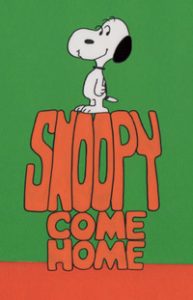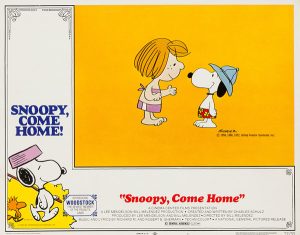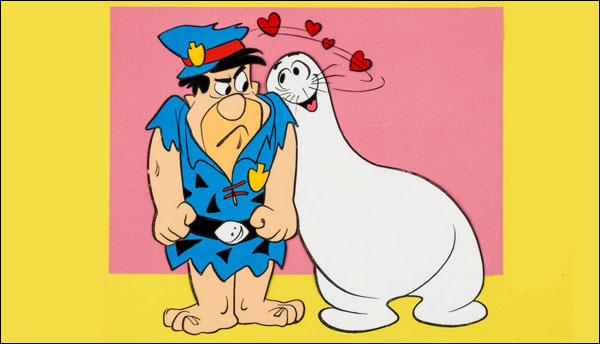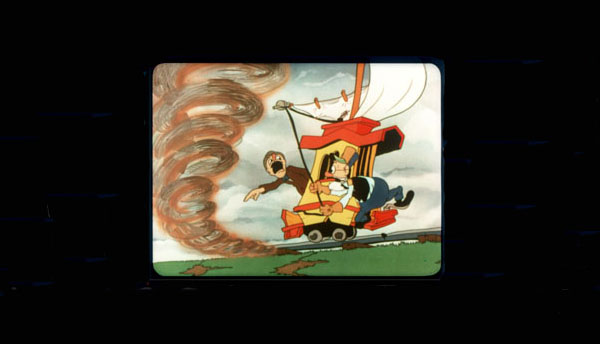
In The Peanuts Book, author Simon Beecroft writes, “Snoopy is no plain ol’ dog. [Charles] Schulz said, “Snoopy refuses to be caught in the trap of doing ordinary things like chasing and retrieving sticks.’”
Since Charles Schulz introduced him in the third Peanuts comic strip in 1950, Snoopy caught on with readers, and by the 1960s, Peanuts had developed a universal audience. Soon, the characters were everywhere, not just in TV specials, the Broadway stage, and the silver screen, but on lunch boxes, toys, greeting cards, board games, and t-shirts, just to name a few of the platforms that brought Charlie Brown and the gang everywhere.
 Front and center of this ever-lasting pop culture phenomenon was an icon within the iconic group – Snoopy, Charlie Brown’s dog. By the early ‘70s, the image of Snoopy registered instant recognizability with everyone not living under that rock that Charlie Brown got at Halloween.
Front and center of this ever-lasting pop culture phenomenon was an icon within the iconic group – Snoopy, Charlie Brown’s dog. By the early ‘70s, the image of Snoopy registered instant recognizability with everyone not living under that rock that Charlie Brown got at Halloween.
It seemed logical that Snoopy would get own his full-length feature film – Snoopy Come Home, which debuted on August 9, 1972, and celebrates its fiftieth anniversary this year.
As the title suggests, Snoopy, Come Home tells the story of how Snoopy runs away from home to visit a young girl named Lila, who is in the hospital and has written to Snoopy asking that he visit her.
Snoopy, frustrated at many places with signs that read “No Dogs Allowed,” decides to set off to see her, leaving Charlie Brown and the gang behind.
With Woodstock in tow, Snoopy goes on this adventure, which includes getting adopted by a pet-obsessed girl named Clara before he eventually meets up with Lila.
Lila asks Snoopy to stay with her, which he decides to do, going back home to say goodbye to Charlie Brown (who is obviously very upset). The group throws Snoopy a farewell party, and he sets off to be with Lila.
 However, when Snoopy gets to Lila’s apartment building, he notices another sign that reads: “No Dogs Allowed.” Taking this as a literal sign, Lila agrees that, because of that, Snoopy should go back to Charlie Brown.
However, when Snoopy gets to Lila’s apartment building, he notices another sign that reads: “No Dogs Allowed.” Taking this as a literal sign, Lila agrees that, because of that, Snoopy should go back to Charlie Brown.
Of course, all the kids are thrilled, except for Lucy, who says to Charlie Brown, “He’s your dog, and you’re welcome to him!”
Snoopy, Come Home was a unique Peanuts story. It contains the more “adventurous” plot of many of the Peanuts features, where one or all of the characters leaves the neighborhood (this would also be a part of 1977’s Race For Your Life, Charlie Brown and 1979’s Bon Voyage, Charlie Brown (And Don’t Come Back)”). However, Snoopy Comes Home has also gained the reputation of being one of the melancholier of the Peanuts stories – Snoopy leaving Charlie Brown is painful enough, but also visiting the hospital and eventually parting from Lila are very sad plot points.
The film is also noteworthy for several reasons, including the introduction of Woodstock, the little, spike-haired yellow bird who would be Snoopy’s forever sidekick after Snoopy Come Home.
Additionally, if the songs in Snoopy, Come Home seem to have a Disney flair, that’s because they were composed by Robert and Richard Sherman. The Sherman Brothers, of course, are the legends who created Disney music for an entire generation, with films like Mary Poppins (1964) and The Jungle Book (1967), as well as theme park attractions, such as “It’s a Small World.” Greg Ehrbar writes more about this here, on this post.
 In their book, Walt’s Time: From Before to Beyond, the Sherman Brothers discussed the unique way they demonstrated the songs for Charles Schulz, who went by the nickname “Sparky.” Robert and Richard wrote: “To our amazement, instead of listening to our material in his office, Sparky took us to his private ice rink, where we watched him skate round and round while listening to our songs over the loudspeakers.
In their book, Walt’s Time: From Before to Beyond, the Sherman Brothers discussed the unique way they demonstrated the songs for Charles Schulz, who went by the nickname “Sparky.” Robert and Richard wrote: “To our amazement, instead of listening to our material in his office, Sparky took us to his private ice rink, where we watched him skate round and round while listening to our songs over the loudspeakers.
After several playings, Sparky skated over to us, all smiles, and gave us the thumbs up sign.”
When it was released, Snoopy, Come Home was successful at the box office and with critics, and many consider it the best of the Peanuts feature films. This included critic Howard Thompson in The New York Times, who wrote: “This sprightly, clever and hilarious treat – all that a comic strip could be on screen – is even better than A Boy Named Charlie Brown, which began the series.”
Leave it to Snoopy to, once again, show up his master, good ol’ Charlie Brown.
SNOOPY, COME HOME airs this Sunday at 7pm ET/PT on MeTV.


 Michael Lyons is a freelance writer, specializing in film, television, and pop culture. He is the author of the book, Drawn to Greatness: Disney’s Animation Renaissance, which chronicles the amazing growth at the Disney animation studio in the 1990s. In addition to Animation Scoop and Cartoon Research, he has contributed to Remind Magazine, Cinefantastique, Animation World Network and Disney Magazine. He also writes a blog, Screen Saver: A Retro Review of TV Shows and Movies of Yesteryear and his interviews with a number of animation legends have been featured in several volumes of the books, Walt’s People. You can visit Michael’s web site Words From Lyons at:
Michael Lyons is a freelance writer, specializing in film, television, and pop culture. He is the author of the book, Drawn to Greatness: Disney’s Animation Renaissance, which chronicles the amazing growth at the Disney animation studio in the 1990s. In addition to Animation Scoop and Cartoon Research, he has contributed to Remind Magazine, Cinefantastique, Animation World Network and Disney Magazine. He also writes a blog, Screen Saver: A Retro Review of TV Shows and Movies of Yesteryear and his interviews with a number of animation legends have been featured in several volumes of the books, Walt’s People. You can visit Michael’s web site Words From Lyons at: 






















“Snoopy Come Home” would have been the last movie my grandfather ever saw. I remember him singing “No dogs allowed” in his deep bass voice as we came out of the cinema.
The title of Snoopy’s first starring feature pays homage to Lassie’s first film, “Lassie Come Home”, released nearly thirty years earlier. Lassie had been top dog in show business for a very long time, and she still had a weekly TV show in 1972; Pamelyn Ferdin, who had voiced Lucy in “A Boy Named Charlie Brown”, was in it. I have the feeling Schulz must have started with the title and then worked backwards from it to come up with a story to match. To his credit, he took the opposite approach to Lassie’s debut, which is about her struggles to return to her family after having been taken far away from them. Snoopy, on the other hand, leaves home voluntarily; the plot hinges on his own decisions rather than external circumstances. He is not merely a dog, but a complex and compelling character.
Richard Sherman’s anecdote is telling. By 1972, Charles Schulz was a multimillionaire with his own private ice rink, a man in a position to dictate his own terms to pretty much anybody. As such, his comic strip became increasingly less relatable to young people. His sophisticated insight into the indignity and insecurity of childhood diminished as they receded into the past and lost their sting. After “Snoopy Come Home”, I started to think that I might be outgrowing Peanuts. Now, I think it was Schulz who had outgrown the rest of us.
“For Charles M. Schulz, an armored car,
Or maybe one big cookie jar,
To hold the cash he’s pulling down
From merchandising Charlie Brown….” — Frank Jacobs, MAD Magazine
Honestly, I didn’t think it was a bad thing. There were still some topical touches to the strip. Plus, at least it still had week-long storylines, unlike some long-running comics that drop them in favor of the not too memorable gag-a day format.
I couldn’t agree more. Even as a kid I could see the decline and I pretty much quit reading it on a regular basis by the mid seventies. When Fantagraphics began printing the complete strips in book form I picked up the first three volumes-all from before my childhood-and was astonished at how smart and much better they were than the stuff I grew up with.
Yeah, I disaree right there. I thought they still had some kick after that like the storyline where Snoopy tries to break Babe Ruth’s home-run record (at the same time as Hank Aaron was doing it).
My experience with ‘Peanuts’ was that the era from around 1965 through the 70s(which I read after the fact)was the best, for both the strip, and the animated projects.
It was interesting, reading ‘The Complete Peanuts’, that the 1979 ‘Charlie Brown in the hospital’ storyline seemed like the last memorable high point of the strip. 1980 seemed very bland by comparison, and that trend continued.
It’s interesting that this Peanuts film seems to strike a very fine balance between being a straight distillation of the comic strip in its prime (as the original ‘A Boy Named Charlie Brown’ was) and the more driven, action-filled films that would follow it, since this is basically a feature-length version of the earlier special ‘He’s Your Dog, Charlie Brown’ with songs added.
I suppose at best the film is greater than the sum of its parts. The music, and the artwork accompanying some of the song sequences, I remember to this day. I don’t think there’s a song more full of pure joie d’vivre than ‘At the Beach’ or one more wistful than ‘Do You Remember Me?’ The non-song sequences don’t stand out quite as much though some do stand out like Linus’ attempt to recount Snoopy’s past as Charlie Brown keeps fainting (“Are you ready for a shock?” -flop!- “He wasn’t ready for a shock!”).
At the end of this film though, it isn’t just Lucy that’s fed up but all the other kids too when Snoopy’s first act after their joyful reunion is to serve legal notice to reclaim all the items he gifted them when he left!
This movie never fails to make me cry. For all its memorable moments of hilarity — the boxing match between Snoopy and Lucy, the Monopoly game, the scenes with Clara — the scene that most sticks in my mind is when Charlie Brown is sitting up in bed unable to sleep because he misses his dog so much. The song accompanying this scene, “Changes”, is one of the loveliest melodies the Shermans ever wrote, and it’s an absolute heartbreaker.
Agree wholeheartedly. As a kid I used to tear up when I heard two songs: this one and ‘Feed the Birds’ in Mary Poppins. It’s only after reading this article that I discovered they were written by the same people. A few years back I downloaded Snoopy Come Home and lo and behold I cried when I heard It Changes. Somethings never change…
I should point out that ME TV will air “Snoopy Come Home” this coming Sunday.
Yep, I saw it when they aired it. They also aired A Boy Named Charlie Brown the week before if I recall correctly.
I may be in the minority here, but I have always found the “Peanuts” comic strip, and the TV shows spawned by the strip, to be unfunny (I admit to not having seen “Snoopy Come Home”). It’s frustrating to me that my local newspaper continues to run “Peanuts Classics” where in that space they could publish something contemporary and with a harder edge to it.
When I was growing up, most of the kids I knew would have agreed with you. None of them seemed to be into Peanuts. They liked “cartoons where something happens” (their words).
You mean like a certain web comic with a simpler style? Yeah, that’s in my paper and I find it too cynical to be funny. Heck, readers of my local newspaper request it and later want it to be removed a few years later. Yet, we still have it in our incredibly shrinking paper.
Are you talking about FoxTrot? They are hilarious. I like to laugh at Jason Fox’s money-making schemes, especially the old ones from the 90s. In fact I look at my book collections and I roll over the floor laughing most of the time.
Thanks for the mention!
There is another incident indicating that Charles Schulz took a more active role in the music beyond skating. He was present in the recording studio with Richard Sherman, as Schulz himself recalls on the soundtrack album notes:
Unless I’m missing something, it doesn’t sound as though Schulz took an active role in the music at all. According to that quote, all he did was approve what the Shermans had done.
I’m glad to read that Schulz appreciated the Sherman Brothers score, at least the song “It Changes,” which is just right for the scene. I always found the songs on the whole too, well, Sherman Brothers for “Peanuts,” not unlike the Grossman/Hackaday songs for the musical “Snoopy!!!”: too slick and self-consciously show-bizzy for Schulz’ quirky humor. So different from the naive charm of the Rod McKuen songs in “A Boy Named Charlie Brown.” (But then the features lacked the charm of the TV specials–at least the first few.) “Fundamentafriendependability”: really? And the overblown title song somehow seems to celebrate the composers rather than Snoopy.
I grew up with this one too, which I’m sure you are all sick of me sayin’ that.
I find it curious that in your description of the plot, you left out the real reason Snoopy left home to be with Lila?
I remember really liking this movie, especially the songs. And no, not “””as a kid”””, but as a young adult rediscovering his love of animation. I just got my own Internet connection, and used it to research into whatever cartoons that seemed interesting. Bought the DVD, and would watch several times a year for……. 3 years maybe? And then stopped. Perhaps I got all the Snoopy Come Home into my system that could fit. Now I mostly feel indifference.